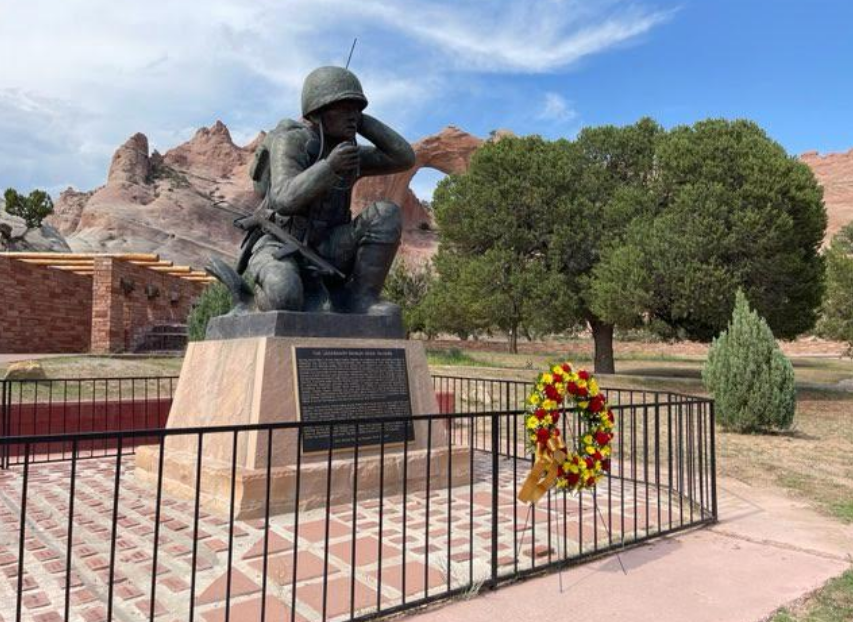
- Details
- By Native News Online Staff
WINDOW ROCK, Ariz. — Navajo Nation President Jonathan Nez, Vice President Myron Lizer, 24th Navajo Nation Council Speaker Seth Damon and Chief Justice JoAnn B. Jayne honored and paid tribute to all Navajo Code Talkers during a live Navajo Code Talker Day, August 14, virtual tribute on Saturday.
The virtual tribute also featured Navajo Code Talker Peter MacDonald, Sr., United States Marine Corps retired General James Mattis, and Miss Navajo Nation Shaandiin Parrish. Due to COVID-19 risks, the annual event was held virtually.
Want more Native News? Get the free daily newsletter today.
“We pay tribute to the Navajo Code Talkers for their courageous service in World War II. At the time of their enlistment, they were very young men, but they answered the call of duty and unknowingly built a humble legacy for the Navajo people that is recognized throughout the world. By using Diné Bizaad, our Navajo language, they helped to win the war and protect the freedom that we have today. Today, we have the opportunity to carry on their legacy by speaking and learning our Navajo language. Many of our warriors have gone on to their final resting place, however, their service and leadership will forever live on in our hearts and memories,” President Nez said.
“Today, we are blessed to have four Navajo Code Talkers remaining with us including Samuel F. Sandoval, Thomas H. Begay, John Kinsel Sr., and former Chairman of the Navajo Nation Peter MacDonald, Sr. We honor them and thank their families for all of their sacrifices.”
During World War II, the Navajo Code Talkers answered the call to defend the United States of America using the impenetrable code based on the Navajo language that is widely acknowledged as a deciding factor in the war effort. On July 28, 1982, former U.S. President Ronald Reagan designated August 14th as “National Navajo Code Talkers Day.”
Navajo Code Talker Peter MacDonald, Sr. also highlighted the sacredness of Diné Bizaad, the Navajo language, and the significance of the Navajo traditional songs and prayers that contributed to the country’s freedom. He honored the Navajo Code Talkers that never returned home to their families and asked the Navajo people to pray and remember them.
More Stories Like This
Native News Weekly (August 25, 2024): D.C. BriefsUS Presidents in Their Own Words Concerning American Indians
Native News Weekly (December 14, 2025): D.C. Briefs
Wounded Knee Massacre Site Protection Bill Passes Congress
Two Murdered on Colville Indian Reservation
Help us defend tribal sovereignty.
At Native News Online, our mission is rooted in telling the stories that strengthen sovereignty and uplift Indigenous voices — not just at year’s end, but every single day.
Because of your generosity last year, we were able to keep our reporters on the ground in tribal communities, at national gatherings and in the halls of Congress — covering the issues that matter most to Indian Country: sovereignty, culture, education, health and economic opportunity.
That support sustained us through a tough year in 2025. Now, as we look to the year ahead, we need your help right now to ensure warrior journalism remains strong — reporting that defends tribal sovereignty, amplifies Native truth, and holds power accountable.
 The stakes couldn't be higher. Your support keeps Native voices heard, Native stories told and Native sovereignty defended.
The stakes couldn't be higher. Your support keeps Native voices heard, Native stories told and Native sovereignty defended.
Stand with Warrior Journalism today.
Levi Rickert (Potawatomi), Editor & Publisher

